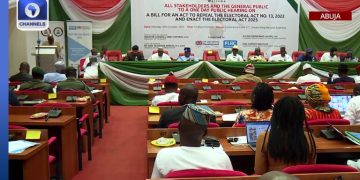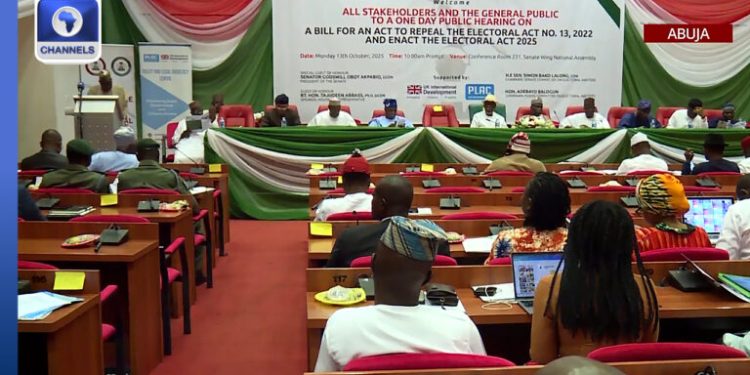Nigeria’s National Assembly has proposed a significant amendment to the country’s electoral framework, recommending that the next general elections be held in November 2026—six months earlier than the usual February schedule.
The proposal is contained in the Electoral Act (Amendment) Bill 2025, unveiled during a joint public hearing organized by the Senate and House Committees on Electoral Matters in Abuja. The bill seeks to repeal the 2022 Electoral Act and replace it with a new one designed to improve the conduct and integrity of elections.
The session drew participation from lawmakers, civil society groups, and other political stakeholders.
Key Proposal: Adjusting Election Dates
According to the draft amendment, elections for the President and state governors must take place no later than 185 days before the end of the current term. This means the next presidential and governorship elections could occur around November 2026, well before the May 29, 2027 handover date.
Lawmakers said the new timeline would ensure that all election petitions and court cases are settled before elected officials take office. However, they also noted that the effectiveness of the change depends on the judiciary’s capacity to handle election disputes efficiently.
The joint committee questioned whether the timeline would be practical if a rerun were ordered close to the expiration of the 185 days, emphasizing the need to strengthen the judicial process.
Other Key Reforms in the Bill
The proposed legislation introduces several other major reforms to Nigeria’s electoral process, including:
1. Inmate and Diaspora Voting
The bill suggests allowing prison inmates and Nigerians living abroad to participate in elections.
2. Voter Identification Reform
The amendment seeks to make Permanent Voter Cards (PVCs) optional. Lawmakers argued that the Bimodal Voter Accreditation System (BVAS) does not use the PVC’s microchip, making the card unnecessary.
Under the proposal, registered voters would be able to download and print their voter cards whenever needed, using their National Identification Number (NIN) or other verified digital means.
This change, the lawmakers explained, will discourage PVC trading and transition voter verification to a fully digital system. The adjustment affects Sections 18 and 47 of the current Act and removes Section 22 entirely.
3. Candidate Nomination and Submission
Political parties will now be required to submit their list of candidates at least 210 days before election day. Only candidates who emerge from validly conducted party primaries will be recognized by the electoral body.
Additionally, the amendment allows candidates from other parties to challenge the nomination process of rival parties. Pre-election cases will only be heard in the jurisdiction where the issue originated or at the Federal High Court in Abuja.
4. Judicial and Constitutional Adjustments
The National Assembly also plans to amend the 1999 Constitution, transferring the power to regulate election timelines from the Constitution to the Electoral Act. Lawmakers said this would allow for more flexibility in adjusting electoral schedules without requiring lengthy constitutional amendments.
Legislative and Executive Process
Both the Senate President and Speaker of the House of Representatives, who were represented at the hearing, pledged that the process would be transparent and accountable.
For the new law to take effect, both chambers of the National Assembly must pass the bill before it is sent to President Bola Tinubu for assent. Once approved, the Independent National Electoral Commission (INEC) will adjust its timetable to reflect the new election dates—potentially making 2026 the earliest general election year in Nigeria’s democratic history.















